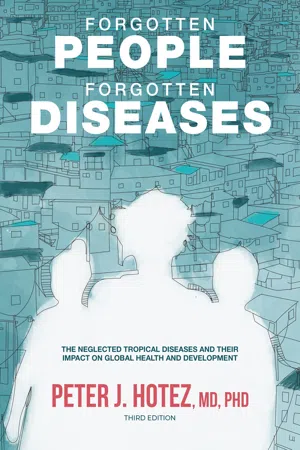
Forgotten People, Forgotten Diseases
The Neglected Tropical Diseases and Their Impact on Global Health and Development
Peter J. Hotez
- English
- ePUB (handyfreundlich)
- Über iOS und Android verfügbar
Forgotten People, Forgotten Diseases
The Neglected Tropical Diseases and Their Impact on Global Health and Development
Peter J. Hotez
Über dieses Buch
The neglected tropical diseases (NTDs) are among the most common infections of the world's poorest people and have profound ramifications on affected populations, including physical, mental, social, and economic. This third edition of Forgotten People, Forgotten Diseases coincides with the third decade of the NTDs movement, which has given access to essential NTD preventative treatments and medications to more than 1 billion people.
Professor Peter Hotez, MD, PhD, one of the founders of the NTD movement, discusses how the NTD space evolved and control was implemented against these ancient scourges, through alliances between nongovernmental development organizations and private-public partnerships. Forgotten People, Forgotten Diseases also
- Reports on the health and economic effects of the NTDs, and the challenges of measuring diseases that do not always kill, but adversely affect productivity, child development, pregnancy outcome, and economic development.
- Lays a roadmap for continued control of existing and newly identified NTDs and spotlights potential opportunities for reducing global poverty and "repairing the world."
- Describes a global initiative to provide annual mass drug administration for more than one billion people affected by NTDs.
- Highlights the role of innovation and product development partnerships for new treatments and vaccines.
- Explains how science and vaccine diplomacy ensure that a new generation of biotechnologies reaches the world's poorest people.
Forgotten People, Forgotten Diseases remains an essential resource for anyone seeking insight into global advocacy coordination and mobilization of resources to combat NTDs and continues to tell the story of the world's people who live in extreme poverty and what it means for them to live with these devastating diseases.
"Like Dr. Hotez, I have struggled with how to best get the word out about our need to address NTDs and their link to poverty. Now he has provided us all with a remarkable tool, a book for people without an extensive scientific or medical background. Forgotten People, Forgotten Diseases is an excellent 'one-stop' primer about NTDs."—Soledad O'Brien, Host, Matter of Fact with Soledad O'Brien